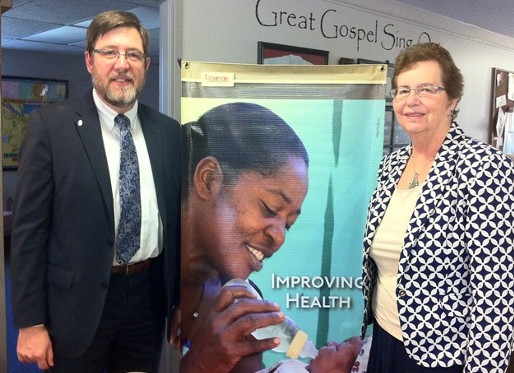The grassroots, including disciples across Michigan, celebrate The United Methodist Commitment to Abundant Health.
Kay DeMoss
Senior Editor-Writer, Michigan Area
After two years of eating pancakes and pedaling bikes, wearing mosquito costumes and sponsoring sing-outs, the Michigan Area today, along with the global church, celebrated the success of Imagine No Malaria.
Imagine No Malaria was launched in 2008. To date, the people of The United Methodist Church have raised more than $68 million to end malaria deaths in Sub-Saharan Africa, where one child dies from malaria every two minutes. The Imagine No Malaria campaign aims to raise $75 million to address the impact of malaria in Africa through prevention, treatment, communication and education.
Waving colorful streamers, brightly clad dancers wove through the plenary hall aisles as an energized congregation was urged to “take a stand and … show the world what we believe in.”
“Can you believe it?” he asked. “We’ve seen malaria deaths cut in half. We’ve seen a stronger church as we’ve worked together. We’ve seen lives transformed because God is able to do more than we can ever ask or imagine!”
Singing a new song
The 12-minute celebration was a collaboration between United Methodist Communications and the United Methodist Board of Global Ministries. It featured a highlights video of the grassroots campaign that has engaged donors of all ages, showcased the impact of the initiative on the continent of Africa and debuted “Able,” a song commissioned by Imagine No Malaria as a gift to United Methodists across the globe.
Jeremy Rosado, a Top 12 contestant on “American Idol,” performed the song for more than 1,000 people attending the event. The song is available as a free download at Amazon Music and the Imagine No Malaria website, as well as on YouTube.
“Today has been an incredible celebration of what God has done through the unified effort of the people of The United Methodist Church,” said Bickerton. “Imagine No Malaria has been successful because of how it energized people who got excited about saving people’s lives. And today, we rejoiced in that success and the people who have made it possible.”
Michigan’s contribution
The celebration at the 2015 West Michigan and Detroit Annual Conferences was admittedly less dramatic but it was an equally awesome moment when Michigan’s Imagine No Malaria Coach, the Rev. Molly Turner, rose to announce the fruit of the Area’s commitment to Imagine No Malaria.

A year later, on May 18, 2016 as the denomination applauds the worldwide effort, Molly says, “Thank you again Michigan Area churches and pastors for stepping up to our $1.5 million challenge for Imagine No Malaria. We gave nearly $1.7 million and over-subscribed our goal! We have been part of saving lives from malaria. Praise be to God!”
A new promise
Celebrating the success of the Imagine No Malaria initiative, speakers, singers and dancers offered even more for United Methodists attending General Conference 2016 to imagine – Abundant Health: Our Promise to Children.
“Health is the ultimate design of God for humanity,” said Bishop Thomas Bickerton, Imagine No Malaria chair. “Health and wholeness have been a hope for Methodists since John Wesley got on a horse in 18th-century England to preach about the love of God and the meaning of faith in Jesus Christ.
“What began with the bite of a mosquito has transformed into a faith-driven global health movement. Together, we have imagined No Malaria. Now let us imagine abundant health.”
Noting that worldwide 6 million children die every year from preventable diseases (diarrhea, birth complications and respiratory infecctions), the report introduced the next step. The United Methodist Church is called to an effort to reach a million children with lifesaving and health-promoting measures by the next time General Conference convenes in 2020.
Building on the success of Imagine No Malaria, the Abundant Health program seeks to engage at least 10,000 U.S. churches in programs that encourage promoting physical activities, healthy diet and nutrition, education for tobacco- and drug-free living and mental health education.
“We’ve imagined no malaria; now let us imagine abundant health,” said Thomas Kemper, Global Ministries top executive.
Dr. Olusimbo Ige, executive director of General Ministries’ Global Health program, a lack of abundant health “is not only when you are sick. It can also mean that your potential for good health is not fully realized. We want to connect with every child in every place, and we are calling on every church and every individual to join us in this effort.”
~Crystal Caviness and Barbara Dunlap-Berg contributed to this report.
Last Updated on January 12, 2023

